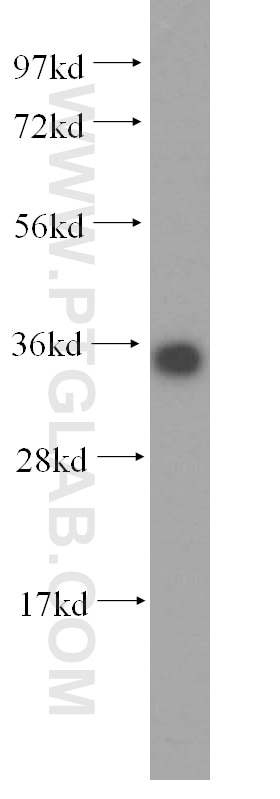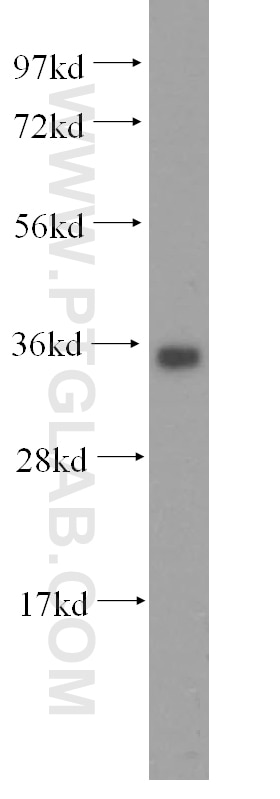- Phare
- Validé par KD/KO
Anticorps Polyclonal de lapin anti-KCNJ15
KCNJ15 Polyclonal Antibody for WB, ELISA
Hôte / Isotype
Lapin / IgG
Réactivité testée
Humain, rat, souris
Applications
WB, IF, IHC, ELISA
Conjugaison
Non conjugué
N° de cat : 15988-1-AP
Synonymes
Galerie de données de validation
Applications testées
| Résultats positifs en WB | cellules HeLa, cellules HepG2 |
Dilution recommandée
| Application | Dilution |
|---|---|
| Western Blot (WB) | WB : 1:500-1:3000 |
| It is recommended that this reagent should be titrated in each testing system to obtain optimal results. | |
| Sample-dependent, check data in validation data gallery | |
Applications publiées
| KD/KO | See 1 publications below |
| WB | See 1 publications below |
| IHC | See 2 publications below |
| IF | See 1 publications below |
Informations sur le produit
15988-1-AP cible KCNJ15 dans les applications de WB, IF, IHC, ELISA et montre une réactivité avec des échantillons Humain, rat, souris
| Réactivité | Humain, rat, souris |
| Réactivité citée | Humain, souris |
| Hôte / Isotype | Lapin / IgG |
| Clonalité | Polyclonal |
| Type | Anticorps |
| Immunogène | KCNJ15 Protéine recombinante Ag8795 |
| Nom complet | potassium inwardly-rectifying channel, subfamily J, member 15 |
| Masse moléculaire calculée | 375 aa, 43 kDa |
| Poids moléculaire observé | 35 kDa |
| Numéro d’acquisition GenBank | BC013327 |
| Symbole du gène | KCNJ15 |
| Identification du gène (NCBI) | 3772 |
| Conjugaison | Non conjugué |
| Forme | Liquide |
| Méthode de purification | Purification par affinité contre l'antigène |
| Tampon de stockage | PBS avec azoture de sodium à 0,02 % et glycérol à 50 % pH 7,3 |
| Conditions de stockage | Stocker à -20°C. Stable pendant un an après l'expédition. L'aliquotage n'est pas nécessaire pour le stockage à -20oC Les 20ul contiennent 0,1% de BSA. |
Informations générales
KCNJ15, also named as KIR1.3, KIR4.2, and IRKK, is a multi-pass membrane protein belonging to the inwardly-rectifying potassium channel (KIR) family. KIR channels perform functions as diverse as the regulation of resting membrane potential, maintenance of potassium ions homeostasis, control of heart rate and hormone secretion. Cloned from human kidney, the KCNJ15 gene is localized on chromosome 21 in the Down syndrome chromosome region 1 (DCR1) and has been identified as a type 2 diabetes-associated risk gene. The gene is most readily expressed in the pancreas and kidney and less in the lung. (PMID: 8995301; 9299242; 20085713)
Protocole
| Product Specific Protocols | |
|---|---|
| WB protocol for KCNJ15 antibody 15988-1-AP | Download protocol |
| Standard Protocols | |
|---|---|
| Click here to view our Standard Protocols |
Publications
| Species | Application | Title |
|---|---|---|
Nat Commun KCNJ15/Kir4.2 couples with polyamines to sense weak extracellular electric fields in galvanotaxis.
| ||
DNA Res Identification of novel genes selectively expressed in the follicle-associated epithelium from the meta-analysis of transcriptomics data from multiple mouse cell and tissue populations. | ||
Ann Surg Oncol KCNJ15 Expression and Malignant Behavior of Esophageal Squamous Cell Carcinoma. |



